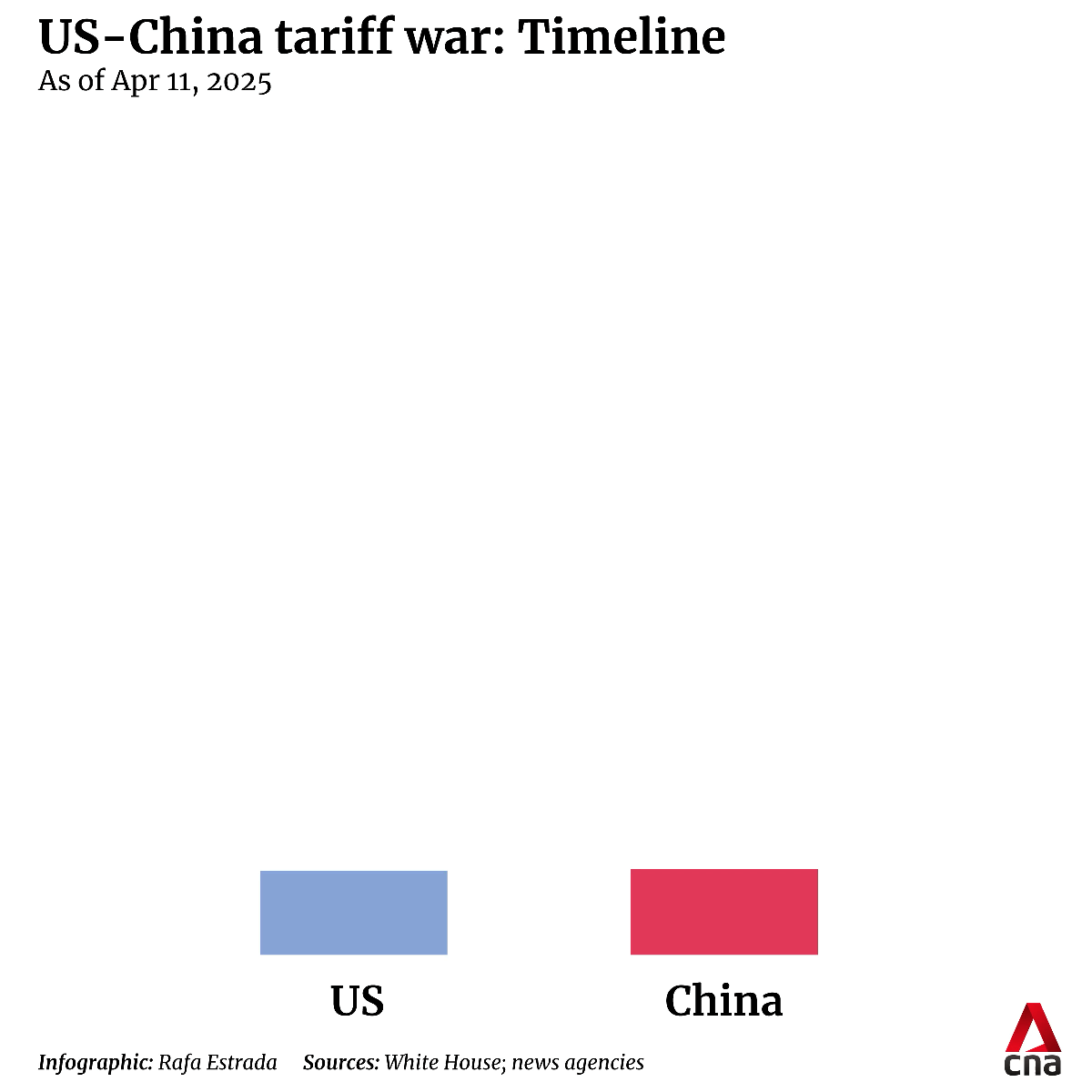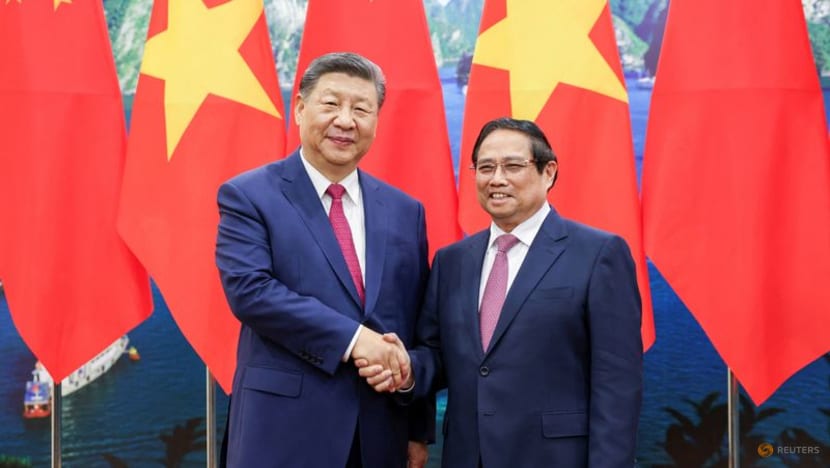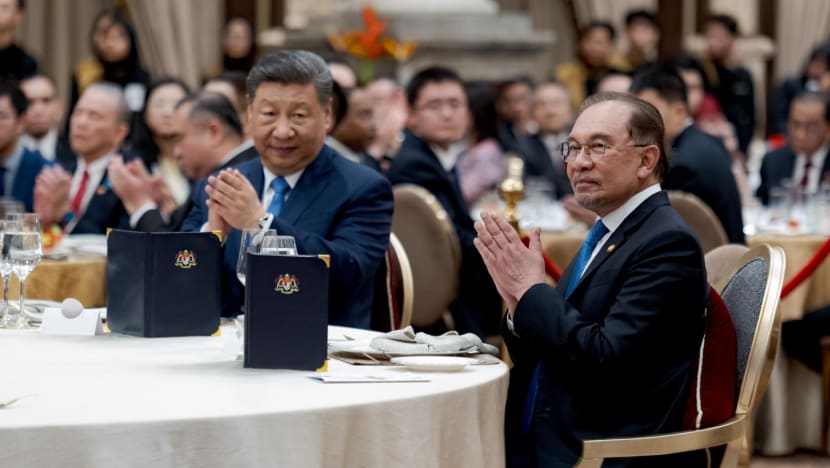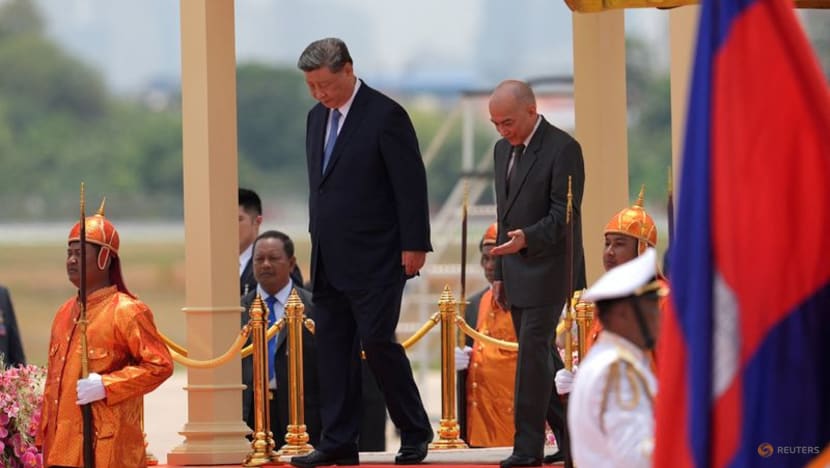How will Xi’s visit aid or hamper Southeast Asia countries in their tariff talks with the US?
KUALA LUMPUR: Fresh from the official visit of Chinese President Xi Jinping this week, Vietnam, Malaysia and Cambodia will aim to use the outcomes to portray a position of strength as they try to negotiate lower tariff rates imposed by the United States, analysts say.
At the same time, these countries will still be wary of being too reliant on Beijing, given the threat of cheap Chinese products flooding their domestic markets and the fear of alienating Washington amid the ongoing negotiations, they added.
Xi spent Monday (Apr 14) and Tuesday in Vietnam before heading to Malaysia on Tuesday evening for a visit until Thursday morning. He then concluded his Southeast Asia tour with a one-day trip in Cambodia on Thursday.
As Vietnam and Malaysia emerge from Xi’s visits having signed dozens of memoranda of understanding (MOU) in areas ranging from security to railway cooperation, analysts told CNA on Thursday that the Southeast Asian countries are sending a signal to the US that they will not be held ransom in tariff negotiations.
"You do not go to the negotiating table with a bloody nose begging for the tariffs to be reduced; it is important to project strength while negotiating,” said Adib Zalkapli, managing director of Viewfinder Global Affairs, a Malaysia-based geopolitical consultancy firm.
“So, you can say that Vietnam and Malaysia are projecting their strength firstly through ASEAN (Association of Southeast Asian Nations) unity and now highlighting their strong bilateral ties with China.”
Xi’s Southeast Asia tour comes as China is engaged in a tit-for-tat trade war with the US, with US President Donald Trump specifically excluding Beijing from a 90-day reciprocal tariff reprieve he granted for other countries.
Earlier this month, the Trump administration slapped tariffs of 145 per cent on most Chinese imports. Beijing later responded with its own 125 per cent tariffs on American products coming into China.
ASEAN member states' economic ministers had met last Thursday to discuss the US tariffs and the 10 countries agreed that they would not respond with retaliatory measures.
Xi’s Southeast Asia tour is a well-timed and strategic charm offensive aimed at strengthening regional ties while bolstering Beijing’s reputation as a dependable economic partner, analysts previously told CNA.
Still, given that the US remains a key trading partner for Malaysia and Vietnam, which also have to contend with their own maritime disputes with China, the optics and outcomes of Xi’s visit were the result of a fine balancing act, the observers said on Thursday.

In a sign of how the US might be keeping a close eye on China’s overtures in Southeast Asia, Trump has described Xi's meeting with Vietnamese leaders as one that was “trying to figure out, how do we screw the United States of America”.
Abdul Rahman Yaacob, a research fellow in the Southeast Asia programme at the Lowy Institute think tank in Australia, said Xi’s trips to the three countries aimed to project China's image as a more reliable and responsible partner for the region, especially since Washington is “confused” about its direction in imposing sweeping tariffs.
“The three countries are still developing and maintaining close relations with China (which) is critical to access resources for developments, especially since USAID has ceased many projects,” he told CNA, referring to Trump’s hollowing out of the US development agency.
“Having said that, they will avoid being over reliant on China, and will seek to expand their economic partnerships."
VIETNAM’S “SOPHISTICATED” BALANCING ACT
Ahead of his arrival in Vietnam on Monday, Xi called for stronger ties with Hanoi on trade and supply chains amid disruptions caused by US tariffs.
According to Chinese state media outlet Xinhua, Xi told Vietnam's Communist Party Secretary-General To Lam during his visit to "jointly oppose unilateral bullying", although he stopped short of naming the US.
The countries also signed dozens of cooperation agreements, footage of the documents reviewed by news agency Reuters showed, including deals on enhancing supply chains and railway cooperation.
“Faced with the uncertainty, instability and unpredictability of the international situation, the two sides will firmly uphold multilateralism," a joint statement from the two countries said.

Vietnam's approach to its relations with China is to “walk along with Beijing” but stand up to its larger and more powerful neighbour if necessary, Abdul Rahman said, highlighting that Hanoi is able to isolate South China Sea tensions from broader ties.
Vietnam, Malaysia, Indonesia, Brunei and the Philippines have overlapping claims with China in the strategic and resource-rich waterways, most of which Beijing claims as its own.
“Hanoi is sophisticated in balancing between the US and China. Behind the scenes, I believed Vietnamese officials would engage their American counterparts to address any concerns Washington may have about the visit,” Abdul Rahman added.
Vietnam was facing US tariffs of up to 46 per cent - the third-highest in ASEAN - before the Trump administration issued the 90-day pause last week. Hanoi had reportedly proposed to cut tariffs on US imports to zero before the reprieve.
Chong Ja Ian, a political science professor at the National University of Singapore, said that Vietnam would “obviously complicate” its efforts to negotiate with Washington had it fully endorsed Beijing’s position on the US levies.
“Vietnam’s leadership will obviously not want to contradict Xi during or soon after his visit, but they are likely to find ways to mollify the Trump administration as they discuss tariffs,” he told CNA.
“Moreover, many of the documents inked during Xi’s visit seemed to be MOUs which are indications of intent, but non-binding.”
“POSITIVE” OPTICS FROM XI’S MALAYSIA VISIT
Meanwhile, Xi’s visit to Malaysia yielded 31 MOUs and documents covering various sectors of cooperation, including on upgrading the countries’ joint industrial parks as well as setting up a joint diplomatic and defence dialogue.
During the visit, Xi and Malaysia Prime Minister Anwar Ibrahim traded Malay and Chinese proverbs before acclaimed Malaysian singer Siti Nurhaliza serenaded the leaders with a Mandarin classic.
In a starkly-worded speech, Anwar said he sees "steadiness, reliability and purpose" in China’s conduct at a time when multilateralism is under "tremendous strain".
While Chong believes Xi’s visit has been “positive” in terms of soundbites and optics, especially for domestic audiences in Malaysia, China and ASEAN, he said it remains unclear how this might affect Malaysia’s tariff negotiations with the US.
The Trump administration had imposed a 24 per cent reciprocal tariff rate on Malaysia before the reprieve, prompting Putrajaya to plan a diplomatic mission to Washington for later this month.
Malaysia is the current rotating chair of ASEAN.

Anwar had reiterated that the regional bloc will not impose retaliatory tariffs on China. However, ahead of Xi’s visit, Anwar himself acknowledged that it would be difficult for ASEAN to maintain its centrality and a balance between the US and China.
“How (Xi’s visit) changes the situation is less clear, including on how negotiations with the United States might work,” Chong said. “Moreover, there remain outstanding issues with China that remain unaddressed.”
These include territorial disputes as well as a potential oversupply of Chinese goods to Southeast Asia as trade gets diverted away from the US, putting pressure on Southeast Asian economies and smaller businesses.
“The extent to which China is able to provide a market for Southeast Asian goods given its low domestic demand and traditional use of Southeast Asian components in manufacturing exports to the United States, as well as Beijing’s ability to provide financing given its own economic headwinds were left undiscussed as well,” he added.
As with Vietnam, Malaysia faces a “difficult act” of balancing its relations with both the US and China, Abdul Rahman said.
“It has territorial disputes with China, but Beijing is a key trading partner,” he said.
“Malaysia under Anwar has put up positive optics about China. But on the defence front, the Malaysians are building their capabilities in Sabah and Sarawak, facing the South China Sea.”
Abdul Rahman said he would be interested to see how the two countries’ joint foreign and defence dialogue develops, as this signals China's push for closer defence relations with Malaysia.
"At this point, it is difficult to assess if these agreements may affect Malaysia's efforts to negotiate lower tariffs with the US, as Trump consistently gives out mixed signals on tariffs,” he added.
ASEAN MUST “RECALIBRATE” AMID US-CHINA TRADE WAR
Over in Cambodia, a government spokesperson said the country was betting on more financial and infrastructure development support from China ahead of Xi’s visit on Thursday.
Cambodia, one of China’s staunchest allies in the region, was hit with a 49 per cent reciprocal US tariff, one of the highest rates globally and the highest in ASEAN, ahead of Laos (48 per cent) and Vietnam.
A major exporter of clothing and footwear to the US, Phnom Penh has dangled lower import taxes on US products in efforts to stave off the tariffs.

After touching down in Phnom Penh, Xi was greeted by King Norodom Sihamoni at the airport and a military welcome ceremony.
Former Cambodian leader Hun Sen and his son Prime Minister Hun Manet later met Xi.
Chinese state media Xinhua said Xi told Hun Sen that trade wars undermine the multilateral trading system and impact the world economic order. Hun Manet had earlier described Xi's visit as a display of the two countries' "iron-clad" friendship.
Both sides signed 37 documents during Xi's visit, including on investment, trade and finance, Cambodia's government was reported as saying by Reuters, though Phnom Penh did not elaborate.
Lowy Institute’s Abdul Rahman said he was not surprised to see “similar rhetoric” emerging from Xi’s Cambodia visit as in the first two countries he had visited, with “plenty of agreements” signed.
But Abdul Rahman pointed out that China has ceased approving new loans to Cambodia since January 2024, amid concerns that the current Cambodian government under Hun Manet might be moving towards the US.
“Xi may use this visit to reinforce the message that China is a reliable security and economic partner,” he said.
Chong said the tone and optics of Cambodia’s reception towards Xi could be “amplified” given the close ties between Beijing and Phnom Penh.
“That said, no one can be sure of whether or how Cambodia can effectively calibrate its ties with Washington and Beijing given the uncertainty in the United States and the highly negative tone between China and the United States at the moment,” he added.
Analysts said that overall, the statements issued by the countries that hosted Xi have been relatively measured.
“They don't want to obviously antagonise the US, because all of them have shown that initiative and the inclination to pursue negotiations over the eventual tariffs that will be imposed,” Harrison Cheng, director of global risk consultancy Control Risks’ Singapore office, told CNA’s Asia First television programme.
“At the same time, they do want to show the US that they have options, right? They have friends in the region who can help them, albeit not immediately.”
Adib from Viewfinder Global Affairs said this does not mean the countries are taking sides or becoming pro-China.
“This is part of the process, part of the broader response to the Liberation Day tariffs,” he said, referring to Trump’s initial announcement of the reciprocal tariffs.
Despite that, Chong cautioned that ASEAN has to "recalibrate" after benefitting from being middlemen in the US-China economic relationship.
"Holding on to existing positions when the underlying dynamics have changed may result in losses, some of them potentially significant. ASEAN and ASEAN member states may be facing that risk right now,” he said.
“They may ultimately have to look at other options for cooperation and economic growth other than the United States and China, or end up looking like the investment bank Bear Stearns during the 2008 Global Financial Crisis. It went bankrupt."
免责声明:投资有风险,本文并非投资建议,以上内容不应被视为任何金融产品的购买或出售要约、建议或邀请,作者或其他用户的任何相关讨论、评论或帖子也不应被视为此类内容。本文仅供一般参考,不考虑您的个人投资目标、财务状况或需求。TTM对信息的准确性和完整性不承担任何责任或保证,投资者应自行研究并在投资前寻求专业建议。
热议股票
- 1
- 2
- 3
- 4
- 5
- 6
- 7
- 8
- 9
- 10